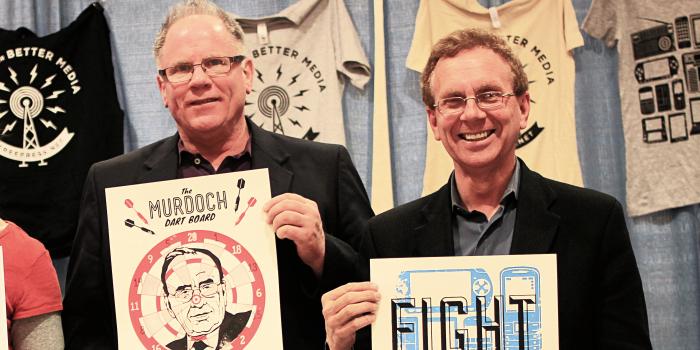Press Release
Verizon Wireless Falls Flat in Response to Free Press App-Blocking Complaint
Contact: Timothy Karr, 201-533-8838
WASHINGTON -- On Monday, Verizon Wireless submitted its response to Free Press’ complaint about the carrier's decision to block subscribers from accessing "tethering" applications on their 4G phones. Verizon Wireless called for dismissal of the complaint, as it tried to avoid responsibility for its decision to restrict customers' ability to use the applications and devices of their choosing on its LTE network.
In June, Free Press filed a complaint with the Federal Communications Commission alleging that Verizon Wireless's actions to remove tethering applications from the Android Market were a violation of the license conditions for the spectrum on which Verizon operates its network.
Free Press Policy Director Matt Wood made the following statement:
“Verizon Wireless's arguments in favor of blocking don't hold water. Its decision to block tethering applications is an anti-consumer practice that chills innovation and punishes subscribers who already pay a lot for data. It also violates specific license obligations that Verizon Wireless agreed to when it used the public airwaves to build its 4G mobile broadband business.
“Terms of service agreements do not supersede federal regulations. The license obligations that Verizon Wireless agreed to require it to allow subscribers to use any legal devices and applications on its network. It doesn’t get a pass for telling consumers ahead of time that they are barred from connecting their devices to Verizon’s network, or using the applications of their choice on the network.
“Verizon Wireless also seems to think it can pin the blame on Google for removing the applications from its Android Market, but the conditions placed on the licenses make clear that the licensee cannot interfere in any way with users' ability to access the applications of their choice. Regardless of whether Verizon is actively requesting or contractually requiring Google to filter applications, it is violating these conditions.
“Verizon Wireless essentially claims that subscribers who use tethering apps are stealing service, but this argument is as ridiculous as it is offensive. When users buy wireless data service -- whether capped or unlimited -- they should be free to decide how they use that data. Verizon would rather call tethering a separate service and require its subscribers to pay twice for the same data. But under that warped view, what’s to stop a carrier from deciding that instant messaging or streaming video applications compete with the carrier's own services, and consequently blocking subscribers from accessing these applications?
“The FCC needs to take swift action to prevent a dismal wireless future, and must set a precedent of real consumer protection. We urge it to find that Verizon Wireless violated the conditions of its licenses, and to put a stop this anti-consumer behavior immediately.”
In June, Free Press filed a complaint with the Federal Communications Commission alleging that Verizon Wireless's actions to remove tethering applications from the Android Market were a violation of the license conditions for the spectrum on which Verizon operates its network.
Free Press Policy Director Matt Wood made the following statement:
“Verizon Wireless's arguments in favor of blocking don't hold water. Its decision to block tethering applications is an anti-consumer practice that chills innovation and punishes subscribers who already pay a lot for data. It also violates specific license obligations that Verizon Wireless agreed to when it used the public airwaves to build its 4G mobile broadband business.
“Terms of service agreements do not supersede federal regulations. The license obligations that Verizon Wireless agreed to require it to allow subscribers to use any legal devices and applications on its network. It doesn’t get a pass for telling consumers ahead of time that they are barred from connecting their devices to Verizon’s network, or using the applications of their choice on the network.
“Verizon Wireless also seems to think it can pin the blame on Google for removing the applications from its Android Market, but the conditions placed on the licenses make clear that the licensee cannot interfere in any way with users' ability to access the applications of their choice. Regardless of whether Verizon is actively requesting or contractually requiring Google to filter applications, it is violating these conditions.
“Verizon Wireless essentially claims that subscribers who use tethering apps are stealing service, but this argument is as ridiculous as it is offensive. When users buy wireless data service -- whether capped or unlimited -- they should be free to decide how they use that data. Verizon would rather call tethering a separate service and require its subscribers to pay twice for the same data. But under that warped view, what’s to stop a carrier from deciding that instant messaging or streaming video applications compete with the carrier's own services, and consequently blocking subscribers from accessing these applications?
“The FCC needs to take swift action to prevent a dismal wireless future, and must set a precedent of real consumer protection. We urge it to find that Verizon Wireless violated the conditions of its licenses, and to put a stop this anti-consumer behavior immediately.”




